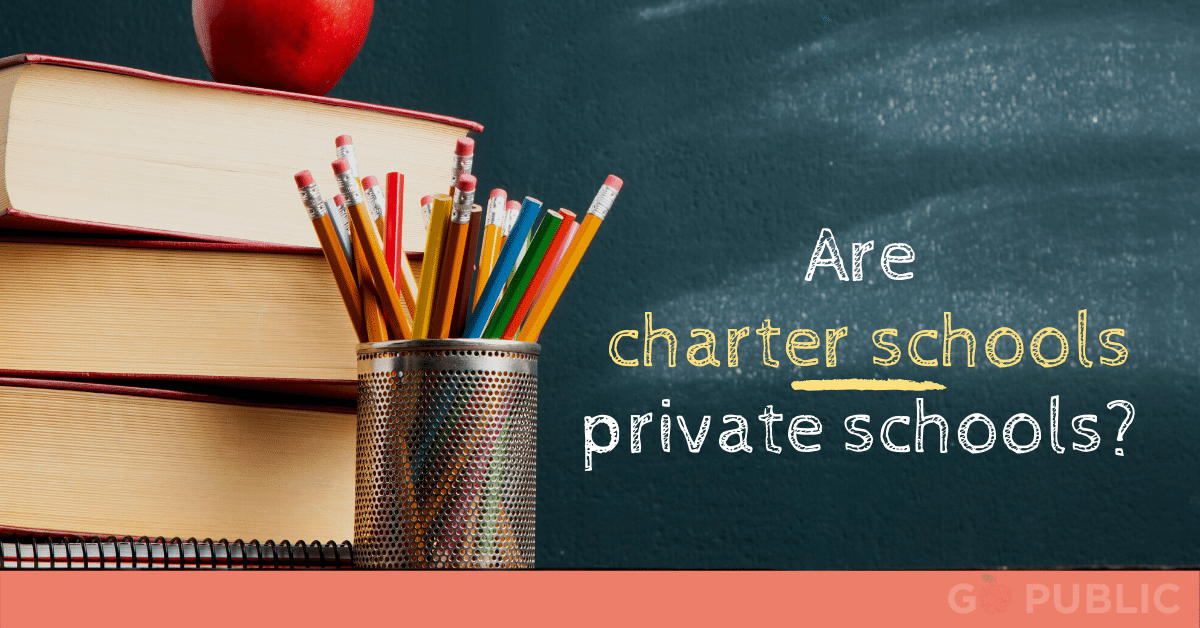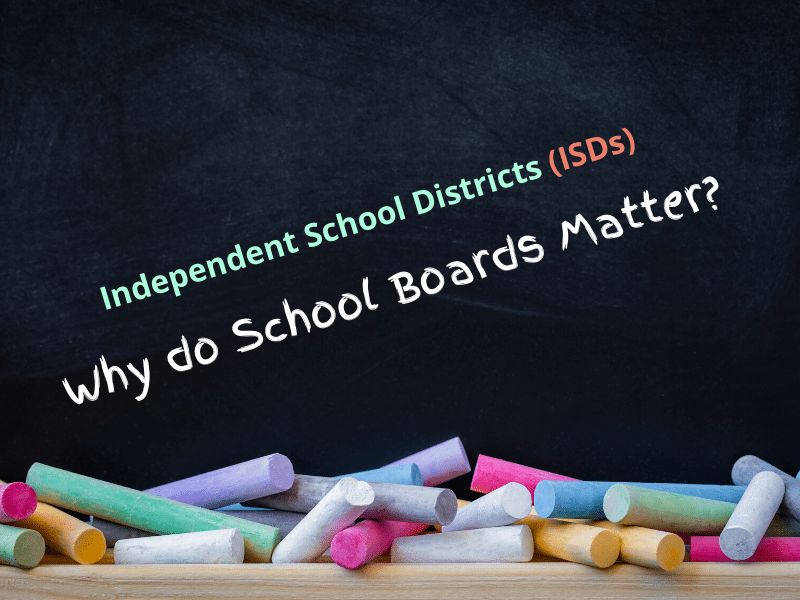Charter schools are a form of public schools. Charter schools are also private schools. However, they are not the kind of private schools one might associate with religious education or an independent institute. Instead, private refers to the entities that manage the charters.
A private, for-profit organization provides administrative services to the non-profit charters it sets up. The private organization can make a profit in a variety of ways.
Charter schools are free due to public, taxpayer dollars that are taken from traditional public schools when a child enrolls in the charter school. Unlike a traditional public school, charter schools are also funded by private companies, individuals, and interests. They are managed by a private entity vs a community elected board where the public has input. And their boards are appointed vs elected. This means that charter board members can have a financial interest in the success of the schools.
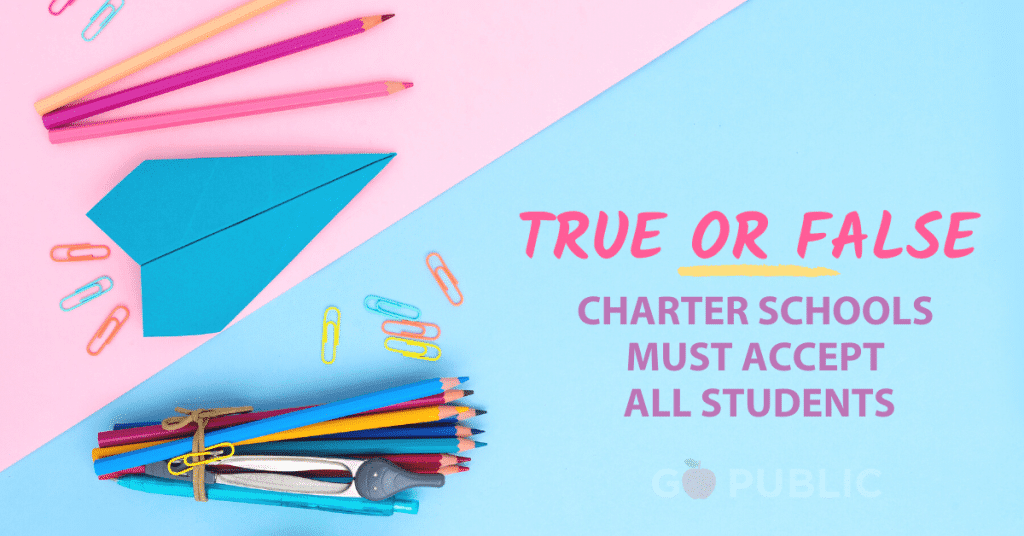
FALSE
Unlike traditional public schools, charter schools are not required to accept all students. Read below to learn more.
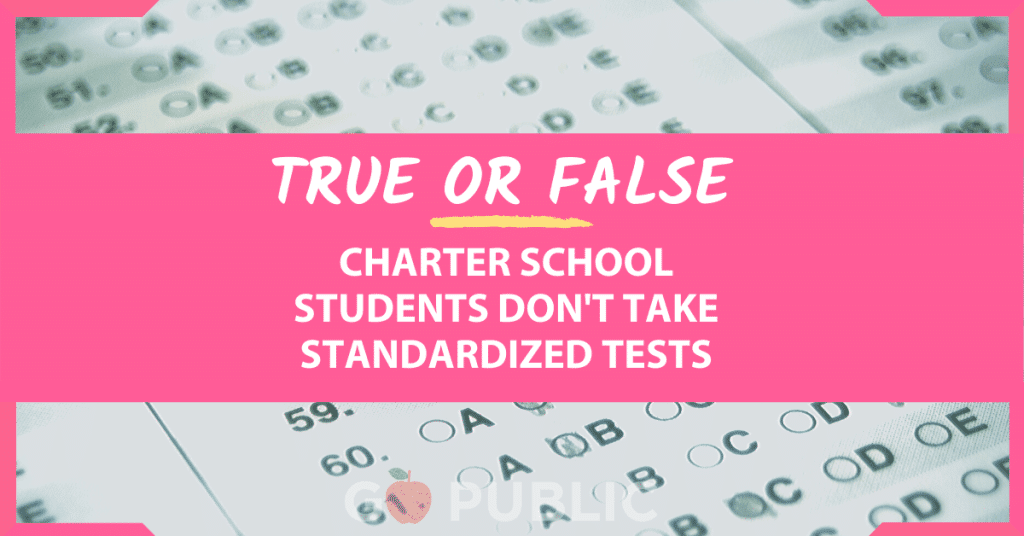
FALSE
Charter school students are required to take standardized tests.
Charter schools are charter schools, not free private schools
For charters, private refers to the funding sources such as private companies and individuals who can make decisions about a child’s education without community or public input. Charter schools operate under a charter, drawn up by a private group or entity. Charter schools might use the term “free private schools”, while at the same time stating that they are public schools. This can lead to confusion for parents.
Charter schools are simply charter schools. They use a mix of public dollars and private funds as their business model, operate under a charter, and are managed by a private entity. The term “free private school”, if referring to a charter school, is not an accurate statement. It suggests that it’s like a private school.
Private school funding
Private schools can set their own admission and curriculum guidelines because they do not take taxpayer dollars. Religious and independent private schools rely heavily upon student tuition that could range anywhere from a few thousand to tens of thousands of dollars per year.
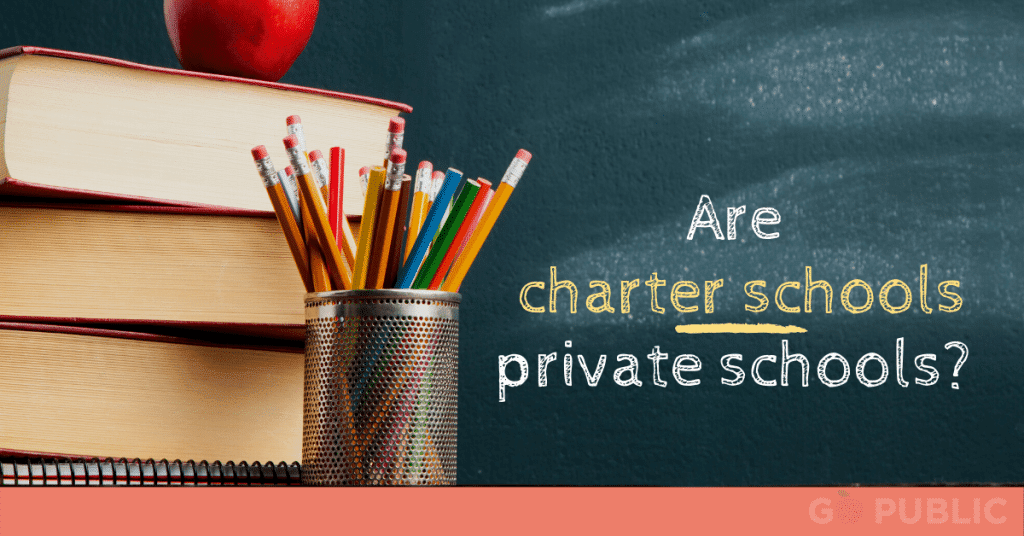
Charter school investments
What’s important to understand is how charters utilize taxpayer dollars, taken from neighborhood public schools, while allowing private interests to invest in their growth and development.
Charters have two funding streams: one is provided by the taxpayer and the other by investments often executed with little public knowledge of intent or interest. Specifically, significant investments from billionaires, foundations, and hedge fund managers enjoy rates and tax advantages that make donating large sums of money to charter schools appealing.
Charter school and public school funding
The public “free” portion of charter schools’ financial structure are taxpayer dollars and federal funds. This matters because when a child enrolls in a charter school vs a public school, funds are diverted from the public school and flow back to the charter school. The public school never recovers those dollars, which can average around $7K/child.
In essence, the taxpayer funds a charter school without receiving any benefits and provides no input on how it operates. In fact, the taxpayer may not even be aware that their dollars are funding a structure that a private company and/or group of investors could reap rewards or gain tax incentives. Moreover, the taxpayer may start to see their neighborhood school struggling because the funds are flowing into the charter. This is a double whammy for the taxpayer who believes his or her taxes are going to serve the students in the traditional public school. Instead, the charter school uses those funds and the public school can suffer.
The taxpayer receives no financial benefit, students in the charter school may or may not receive all of the benefits and services of the public school, and all the while the school district works harder on less funding to save the struggling school. Who wins?
What are the differences between charter schools and public schools
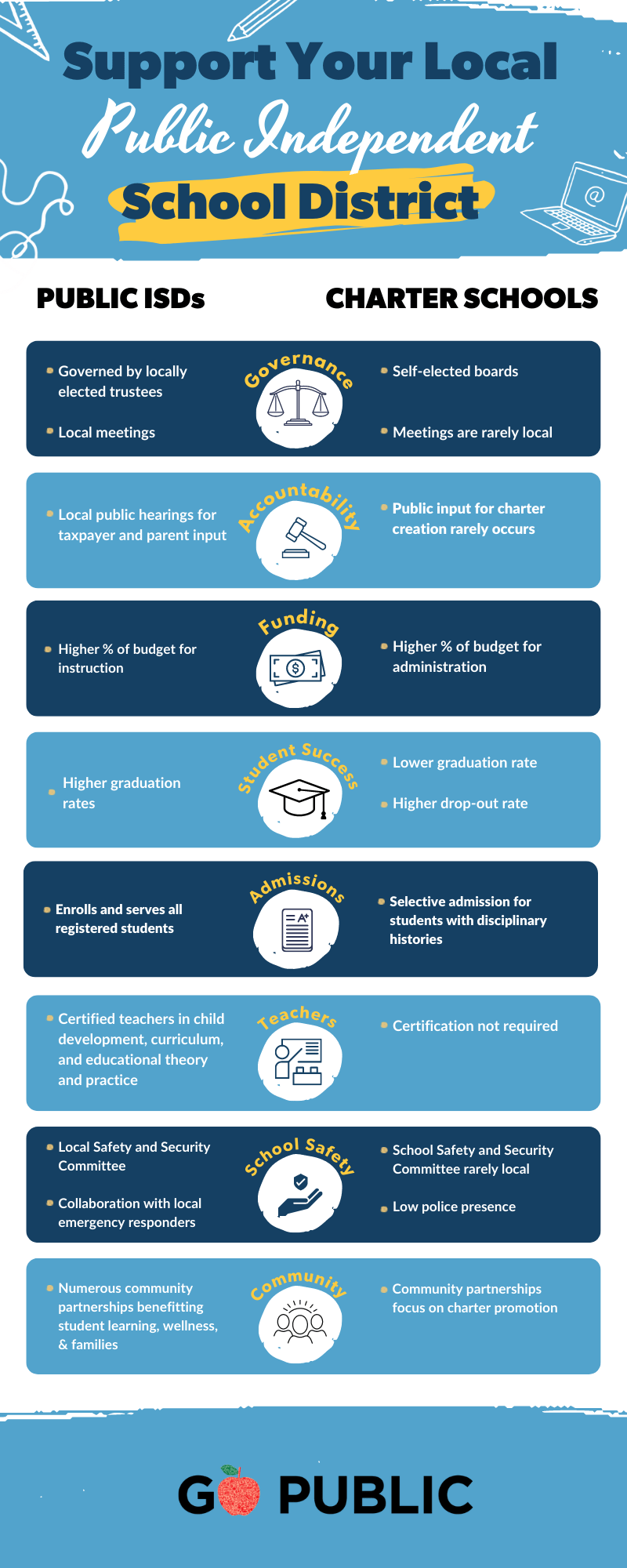
Unveiling the Truth About Charter Schools
Education policy consultant Patti Everitt has dedicated her time to ask questions about how charter schools function in Texas. She speaks out about the challenges that charter schools create for local ISDs, how charter schools are funded, and how that affects Texas families. Patti states, in a Go Behind the Ballot podcast interview, “I spend lots of time trying to understand processes and systems in education. It can be very complicated, particularly for a parent who is trying to make the best choice for their kid. Part of the problem is they don’t have the information. They need to make valid choices. It’s hard to find.”
Read or listen to the full interview here: Patti Everitt- Go Behind the Ballot
High standards of accountability in public schools
Contracts
If Company A has a private interest that’s outside of the state’s required education standards or even procurement of contracts, that could filter down to the child. In other words, Company A may not have the child’s best interests at heart. This could be anything from curriculum, to building safety, to the quality of teachers.
Open record requests
With public schools, the public can request open records of a public school to ensure financial accountability and no conflicts of interest. School districts make their records available, including budgets and payments. Point being, if charter schools are to take public taxpayer dollars, then they should be held to the same high standards of accountability.
Private schools are exempt because they do not take public dollars.
Community involvement and transparency
Charter schools are businesses and therefore city councils must treat them as such during the approval/ application process. Local community members/voters have little say/input in any and all aspects of a charter’s creation.
School Board meetings and trainings
Charter school businesses hold board meetings at their corporate or district offices which are rarely local and/or near their satellite schools. Therefore, parents & local community members must travel to attend an in-person meeting. Public ISDs hold their board meetings within their district boundaries so that parents and community members may easily attend in person.
Evaluating and Improving Student Outcomes (EISO) training is NOT required for charter board members (Texas Charter School Board Handbook), while public ISD trustees must complete a 3 hour course every two years.
Comparison Spending Public Schools vs Charter Schools
Charter schools spend a greater percentage of their annual budget on administration than traditional ISDs, while ISDs dedicate more funds to curriculum and special programs.
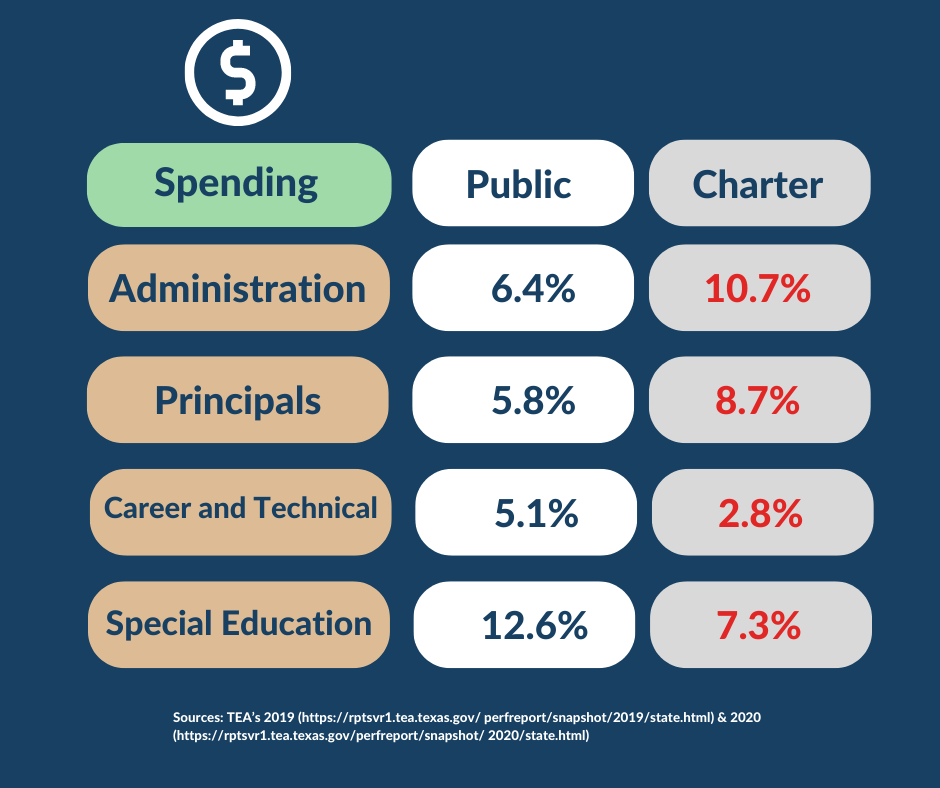
Teacher requirements in charter schools vs public schools
In addition to undergraduate and graduate degrees, public school teachers must acquire certification, most undergo student teaching, and take additional course work. They also receive ongoing professional development throughout the school year. Charter school teachers must have an undergraduate degree but are not required to be certified. Educators like librarians must have a graduate degree in traditional public schools, but this is not a requirement for librarians in charter or private schools. Private school teachers have undergraduate and graduate degrees and their fields of expertise can vary. They do not have to go through certification.
Teacher Stats in Charter vs Public Schools
Public school teachers tend to have more job experience and retention than charter school teachers, while charter school classrooms have more students per teacher.

School Safety- How are public and charter schools different?
All school districts must establish a school safety and security committee. This committee develops emergency plans, coordinates with city/county emergency management personnel/police, and implements emergency plans for each school. (Texas Education Code section 37.109)
Public school districts have local committees that work in collaboration with local emergency responders.
Charter school safety committees, on the other hand, are formed regionally, and therefore they rarely meet locally. This results in less community involvement from emergency responders and a much lower police presence in charter schools.
Admissions in Public and Charter Schools
Public school districts are required by law to provide Disciplinary Alternative Education Programs (DAEP) for students who are suspended or otherwise removed from the classroom due to behavior (Texas Safe Schools Act-1995) .
Charter schools are not required to provide such programs. Rather, charter schools have the authority to determine whether or not they can accept and accommodate students with discipline histories.
What is School Choice, and where to begin?
Parents and students can choose where their educational pathway starts and ends. School Choice is a policy that gives students the choice to attend a school other than the district’s public school (for example, a charter school, home school, private school, or a public school in a different school district). Charter schools can be a solution in some communities, but it is important to question why a charter school is opening in a school district that is successfully serving the community.
If a traditional public school is struggling, one way to improve it is to invest funds and resources to bring it to the level it needs to be to best serve students. When a charter school opens, funds are pulled out of the struggling school, affecting operations, students, and teachers.
What are School Vouchers?
School vouchers are education tax dollars that are diverted from public schools to help subsidize the tuition of private and religious schools.
An op-ed in the Austin American Statesman, School Voucher Program is Not Right for Texas Education, written by David DeMatthews, associate professor in the Department of Educational Leadership and Policy at The University of Texas at Austin, and David S. Knight, assistant professor of education finance and policy at the University of Washington, explains the basic concept of school vouchers. “School vouchers are relatively simple – they are taxpayer-funded government subsidies that parents use to pay private school tuition although tuition and transportation at many private schools exceed the voucher. Families must pay the difference.”
The article continues, “Private schools are also not held to the same standard of accountability as public schools. And they are not legally required to provide fair access and quality services to students with disabilities.”
The Argument Against School Vouchers
Both the National Coalition for Public Education and the National School Boards Association strongly oppose the use of school vouchers. They state that school vouchers:
- Drain critical dollars from public schools.
- Impact public accountability and transparency.
- Leave behind many students in schools that cannot accommodate special needs or English language learners.
- Fail to raise student achievement.
Raise Your Hand Texas (RYHT) explains that school vouchers are ineffective and result in declines in student performance. RYHT states, “Research repeatedly finds that vouchers do not improve student achievement. Recent studies of Louisiana, Indiana, and Ohio voucher programs find that students using vouchers experienced worse academic outcomes than their public school peers. Texas consistently outperforms states with voucher programs on the NAEP national assessment.” (RYHT- The Case Against School Vouchers)
Read more about school vouchers at NSBA- School Vouchers.
Texas School Voucher Scheme
Texas Monthly released a riveting article (October 2022) on a voucher scheme in Texas, hatched by political operatives and leadership of one of the largest charter operators in Texas – ResponsiveEd. “Their confidential proposal went like this: Wimberley would partner with Harris and Bennett’s Texans for Education Rights Institute to create a charter school tentatively dubbed the Texas Achievement Campus. But ‘campus’ was a misnomer, because there would be none. The school would exist only on paper. Texans for Education Rights would then work with ResponsiveEd to place K–12 students from around the state into private schools of their choice at ‘no cost to their families.’ ” -Texas Monthly- Inside the Secret Plan to Bring Vouchers to Texas
In the compelling article by senior editor Forrest Wilder, Responsive Education Solutions is designated as a key organizer of the voucher scheme to siphon public funds to private schools through vouchers. While the Texas Public Charter School Association stated it “had no knowledge of [the] plan”, the CEO of Responsive Ed is also the Chair of the Texas Public Charter School Board of Directors.
The Texas American Federation of Teachers reaction to the article reads, “Now, the worst-kept secret in Texas is out: As public education advocates have long noted, the rapid expansion of privately run charter schools in Texas is…a potential backdoor for school vouchers that would send public dollars to private and religious schools.”
Read the full Texas Monthly article here: Inside the Secret Plan to Bring Vouchers to Texas
Comparison Stats Public vs Charter
Charter schools have become a system increasing overall spending on education with little to no overall increase in student outcomes.

Make the Best School Choice for your student
The best place to begin in determining a child’s educational pathway is to consider the following questions:
- Who or what is managing my child’s education, safety, and development?
- What guarantees, rules, or laws are in place that ensure my child is protected?
- What is the quality of curriculum and does it meet certain standards
- What is the overall quality of teachers?
- Is there a screening process for admission to the school even if it says open to all students?
















